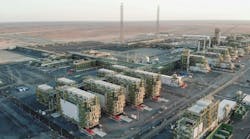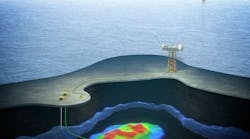The North Sea is often described as a play for big companies.
Statistics appear to bear this out. Twenty of the larger companies dominate production, reserves, and acreage holdings.
In the shadow of the big boys, smaller companies have chalked up a number of notable achievements. For instance, Hamilton Bros. Oil & Gas produced oil from the U.K. sector through the North Sea's first floating production facility.
More recently, the company pioneered the use of concrete platforms for gas production in shallow water and earlier this month disclosed one of the best gas strikes of the year with a high flowing well in the U.K. part of the Irish Sea.
OPERATING LIKE HAMILTON BROS.
Hamilton Bros. has kept small oil fields in business that would have been written off long ago by larger companies and has earned a reputation as a low cost operator. Big companies have tried to copy its style but rapidly realized that to operate like Hamilton Bros. you have to be Hamilton Bros.
With that sort of track record, it is not surprising that Hamilton Bros. Pres. Ed Blair was chosen to talk on opportunities for smaller oil companies in the North Sea at a Financial Times conference in London this month.
Although a number of North Sea independents have been swallowed up in the past few years, Blair pointed out that the contribution of smaller companies since 1982 has increased substantially. Smaller companies now account for 22% of production, compared with only 10% 8 years ago, and control 14% of reserves, up from 9% in 1982.
And because of increased participation by smaller companies in recent licensing rounds, they now control 26% of licensed acreage vs. 19% 8 years ago. This, said Blair, should provide a good opportunity for even higher future participation in reserves and production.
Blair encapsulated the Hamilton Bros. formula for success. The organizational structure must be lean and mean, employing only topnotch people. Successful small companies should not start to act like big companies because they don't have the financial strength or asset base to take big risks.
To thrive in the 1990s, small companies must promote innovative solutions to problems. Many things must be done differently in the new decade, and where small companies are not the operator they may have to use their skills to assist the operator in becoming more innovative.
MANAGING MONEY
Small companies also must employ sound money management, not only in financing but in spending and cost control as well, Blair said. Becoming too highly leveraged should be avoided because there will be many future developments. To participate in those, small companies must retain sufficient financial flexibility to explore and develop projects.
A mixture of oil and gas projects is needed to cushion against unexpected downturns. And Blair warned against becoming too dependent on one field or product.
Companies should be aware of their capabilities and limitations and-most important of all for a small company have the discipline and wisdom to know when to walk away from a high cost, high risk venture.
Copyright 1990 Oil & Gas Journal. All Rights Reserved.

